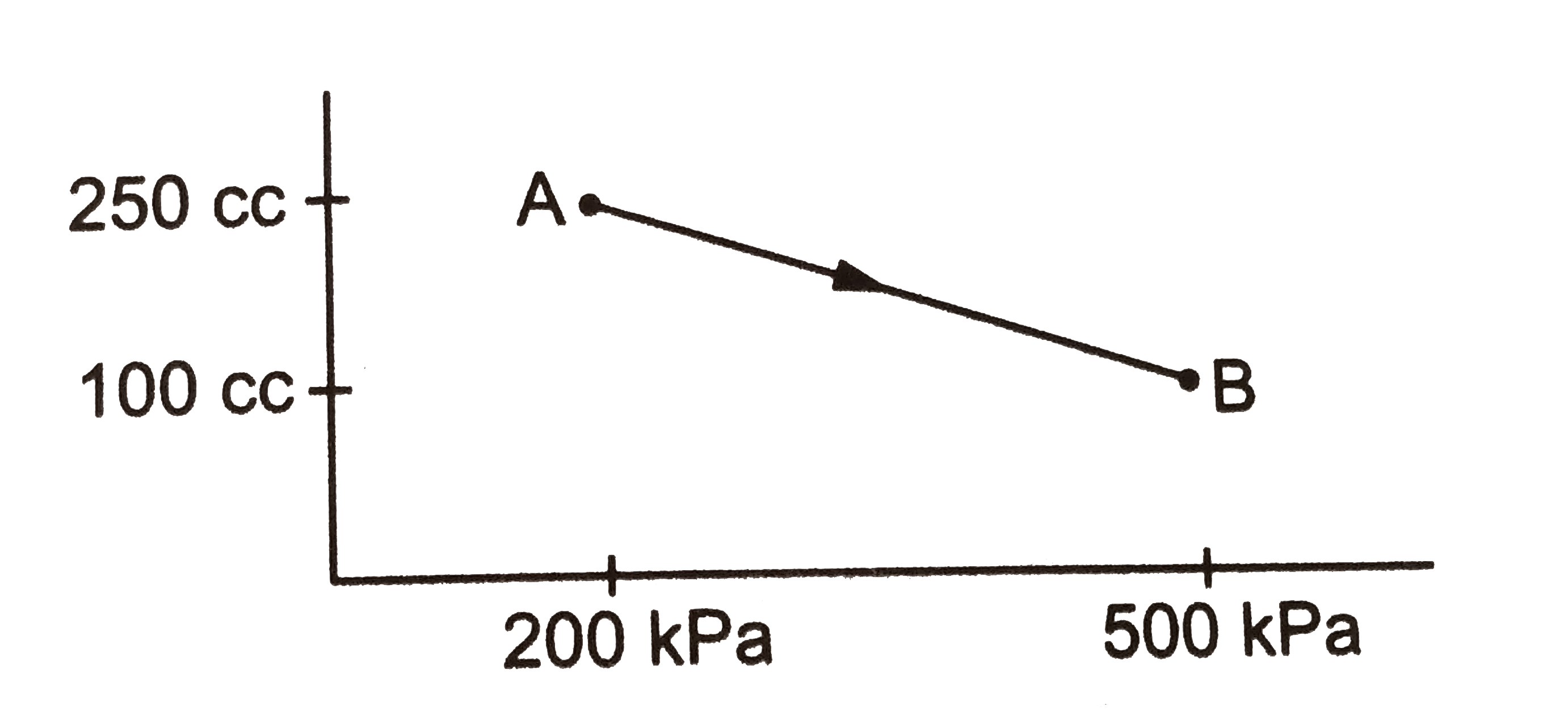5g of a gas is contained in a rigid container and is heated from 15∘C→25∘C . Specific heat capacity of the gas at constant volume is 0.172calg−1^∘C−1 and the mechanical equivalent of heat is 4.2 J cal . Calculate the change in the internal energy of the gas.
To calculate the change in the internal energy of the gas, we will follow these steps:
Step 1: Identify the given values
- Mass of the gas (m) = 5 g
- Initial temperature (T1) = 15 °C
- Final temperature (T2) = 25 °C
- Specific heat capacity at constant volume (s) = 0.172 cal/g°C
- Mechanical equivalent of heat = 4.2 J/cal
Step 2: Calculate the change in temperature (ΔT)
ΔT=T2−T1=25°C−15°C=10°C
Step 3: Calculate the heat (Q) added to the gas
Using the formula for heat:
Q=m⋅s⋅ΔT
Substituting the values:
Q=5g⋅0.172cal/g°C⋅10°C
Q=5⋅0.172⋅10=8.6cal
Step 4: Convert heat from calories to joules
Using the mechanical equivalent of heat:
Q(in joules)=Q(in calories)⋅4.2J/cal
Substituting the value of Q:
Q=8.6cal⋅4.2J/cal=36.12J
Step 5: Determine the change in internal energy (ΔU)
Since the gas is contained in a rigid container, the work done (W) is zero. According to the first law of thermodynamics:
ΔU=Q−W
Since W=0:
ΔU=Q
Thus, the change in internal energy is:
ΔU=36.12J
Final Answer
The change in the internal energy of the gas is 36.12 J.
---
- Mass of the gas (m) = 5 g
- Initial temperature (T1) = 15 °C
- Final temperature (T2) = 25 °C
- Specific heat capacity at constant volume (s) = 0.172 cal/g°C
- Mechanical equivalent of heat = 4.2 J/cal
ΔT=T2−T1=25°C−15°C=10°C
Using the formula for heat:
Q=m⋅s⋅ΔT
Substituting the values:
Q=5g⋅0.172cal/g°C⋅10°C
Q=5⋅0.172⋅10=8.6cal
Using the mechanical equivalent of heat:
Q(in joules)=Q(in calories)⋅4.2J/cal
Substituting the value of Q:
Q=8.6cal⋅4.2J/cal=36.12J
Since the gas is contained in a rigid container, the work done (W) is zero. According to the first law of thermodynamics:
ΔU=Q−W
Since W=0:
ΔU=Q
Thus, the change in internal energy is:
ΔU=36.12J
The change in the internal energy of the gas is 36.12 J.
Topper's Solved these Questions
Similar Questions
Knowledge Check
- Question 1 - Select One
Calculate the change in internal energy when 5g of air is heated from 0∘ to 4∘C. The specific heat of air at constant volume is 0.172calg−1.∘C−1. a) 28.8 J b) 14.4 J c) 7.2 J d) 3.51 J
A28.8 JB14.4 JC7.2 JD3.51 J
A gas is contained in a vessel fitted with a movable piston. The container is placed on a stove. A total of 100 cal of heat is given to the gas and the gas does 40 J of work in the expansion resulting from heating. Calculate the increase in internal energy in the process.
View SolutionA sample of ideal gas (y = 1 .4) is heated at constant pressure. If an amount of 140 J heat is supplied to the gas, then change in internal energy of the gas
View Solution0.32g of oxygen is kept in a rigid container and is heated. Find the amount of heat needed to raise the temperature from 250C→350C. The molar heat capacity of oxygen at constant volume is 20JK−1mol−1.
View SolutionThe change in internal energy when 5 mole of hydrogen is heated to 20∘C from 10∘C, specific heat of hydrogen at constant pressure is 8 cal/mol.∘C is
View SolutionThe molar heat capacity of a gas at constant volume is found to be 5calmol−1K−1. Find the ratioγ=CpCv for the gas. The gas constant R=2 cal mol^(-1) K^(-1).
View Solution4.0g of a gas occupies 22.4 litres at NTP. The specific heat capacity of the gas at constant volume is 5.0JK−1mol−1. If the speed of sound in this gas at NTP is 952ms−1. Then the heat capacity at constant pressure is
View SolutionIn Joly's differential steam calorimeter, 3g of an ideal gas is ccontained in a rigid closed sphere at 20∘C. The sphere is heated by steam at 100∘C and it is found that an extra 0.095g of steam has condensed into water as the temperature of the gas becomes constant. Calculate the specific heat capacity of the gas in (Jg−1K−1. The latent heat of vaporization of water=540calg−1.
View Solution


